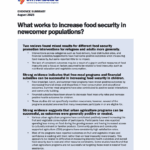Food isintrinsically linked toculture, identity, and for people with lived refugee experiences, cultural foods are acritical part ofsettlement into anew country, which isoften atime ofhigh stress and dislocation from friends and family. However, cultural foods insettlement countries may be unavailable orinaccessible, adversely impacting on food security. This systematic review aimed toidentify facilitators and barriers toaccessing foods inhigh-income countries for people with lived refugee experiences. Sixteen health databases were searched from June 2020 and April 2021 and 22 articles met the inclusion criteria. Bias was assessed using amodified thematic synthesis method and the relevant Joanna Briggs Institute risk assessment checklist. Findings were thematically synthesised and the socio-ecological model and postcolonialism were used as alens through which the data was viewed. Analysis revealed three themes: “Practicalities and Pragmatism”; “Identity, Belonging and Placemaking”; and “Postcolonial and Societal Influences”. The determinants offood security were present across all levels ofthe socio-ecological model and people with lived refugee experiences used practical and pragmatic strategies tofeed their families. Food was intrinsically linked toidentity, belonging and placemaking, and as such, people preferred consuming cultural foods. Societies adversely affected the food security ofpeople from refugee backgrounds by limiting their access toresources and restricting cultural food gathering practices, impacting on their ability toaccess orafford foods, especially cultural foods. To improve food security for people with lived refugee backgrounds, governments and organisations should collaborate with the cultural communities with lived experiences ofaccessing cultural foods, appreciate their strengths, and recognise the value ofsocial and cultural capital.
A Systematic Review on the Impact of Trauma-Informed Education Programs on Academic and Academic-Related Functioning for Students Who Have Experienced Childhood Adversity
The purpose of this study was to conduct a systematic review of the existing literature regarding trauma-informed education programs and their impact on academic and academic-related outcomes. The articles included for review (n=15) contained data on trauma-informed education programs implemented in preschool, primary/elementary, and high school settings. Academic and academic-related outcomes reported included attendance, disciplinary…

